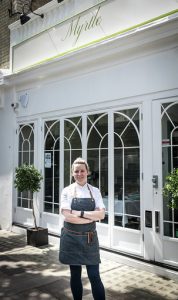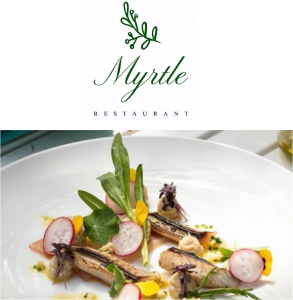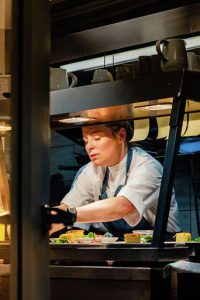When asked by IIBN, Chef and Patron Anna Haugh said that Myrtle Restaurant London is a casual fine dining restaurant, with a strong Irish influence.



You can visit Anna and Myrtle Restaurant at 1A Langton Street, Chelsea SW10 0JL www.myrtlerestaurant.com To make a Reservation Call on 020 7352 2411
How did you get the idea/ concept for Myrtle Restaurant?
I’ve always been so curious of the possibility of having a restaurant that served modern Irish cuisine.
Give a brief account of your education background.
I studied professional cookery at Cathal Brugha street about 20 years ago. I was an apprentice cook at L’ecrivain in Dublin and went to work in Paris and do stages in Spain. When I came to London I worked for; Shane Osborne at Pied a Terre, Philip Howard at The Square, Gordon Ramsay at London House. And now I have My own restaurant called Myrtle.
Did you always know/ever think you would become an entrepreneur when you were younger?
I think deep down I thought I would work for myself. I have never been afraid of going out and taking a chance but still I feel so lucky to have taken the jump and for it to have paid off.
Is entrepreneurship a common trait in your family?
Although I would describe my family as risk adverse there have been a few in the family. I think it really comes down to knowing what you are doing, planning and then going for it.
Did you have prior knowledge of the industry before setting up your company?
Yes, I’ve been cooking for around 20 years now. In those 20 years I have seen all the good, the bad and the ugly that this industry has to offer. I’m lucky to say it has never dulled my love and passion for this industry.
What was your previous work experience (if any)? Do you think this gave you an advantage when setting up your business?
I worked for great people that made some great and brave decisions I also say them make mistakes. I feel I learned a lot watching the people I worked with as well as working with them.
I wouldn’t have been able to open this style of restaurant, if I had not worked in the kitchens that I did. Running a restaurant is far more than just making good food and getting it to the customers table. Particularly, finer type dining, is extremely labour and skill intensive, so you need to have everything in its place. So much love and passion go into this business just to make one plate of food. Sadly, great restaurants close every year. This is not a business for the faint hearted.
How did you initially fund your business? (self-funded, government funding, etc)
Self-funded. Savings and a small bank loan.
Looking back, would you have changed the method of funding you chose?
I would not, I chose this knowing that it would be far more dangerous but in the long run the smarter option. I have the control to protect the identity and honestly of the brand. There is a limited amount of money that can be made from a small restaurant so the less people to pay at the end of the month results in the customer being the main focus.
Did you encounter any financial difficulties in the first year of operation? If yes, what did you do to surpass them?
Yes, sometimes it’s just hand to mouth. The takings just about cover the staff costs, then a good week comes in and covers bills and staff costs. There is a loft of juggling and a lot of thought in how I communicate with my staff to inspire them to treat the business with the attention it needs to survive. In general, though I’ve managed to keep the costs and the spending to reflect what is coming in. It’s been hard because that means I do more jobs that I should, but this is just a short-term plan.
What characteristics do you feel benefited you most when starting your business?
I don’t see a mistake as a mistake. I can learn quickly from the errors I make and am able to understand when my staff make errors too. I believe in walking before I run but I also keep in my mind’s eye there will be a day when I can sprint.
To what do you attribute your company’s success/growth to?
There are people out there that are self-taught, and I tip my hat to them. I am proud to say I am not self-taught. I worked with and learned from a whole group of inspiring and talented people. I am surrounded by kind, strong and honest people. I believe having your ideas challenge and questioned is a blessing but of course you need this to come from a respectable and careful source. Criticism is damaging, perhaps, if it comes from someone who would like you to fail.
What is your opinion on the importance of a professional network for an entrepreneur? Everything about life is the networks you are connected to. Family and friends are something you build from the day you are born but professional networking can be difficult to find genuine professional connections. Its thanks to platform like IIBN that it can be made a little more accessible.
Do you think entrepreneurship has changed in recent years?
The competition is stronger: Quality of restaurant and eaters has dramatically improved. The dining scene is no longer dominated by a handful of chefs. It is because of this that customers are also more educated. I believe this makes it harder for people with less experience to get away with trying their hand at it. The credibility you need to open anything food related is something the customers expect.
Social platforms: 10-20 years ago, if a restaurant had a website it was very rarely updated. Now we have numerous platforms that we have to update daily, to remind the customers that the business is still there and still interesting. The hunger for new content that is one of the most challenging things for us at Myrtle. It takes time to plan and write a post, to organise photo shoots and plan special events. This in itself could be a full-time job for a person. You have to be very careful in what you say and how you say it.
Would you ever consider starting another company or involving yourself in new start-ups again? Absolutely. I love what I have done in the past, I am proud what I am doing today, and I cannot wait for what the future holds.
If you had one piece of advice for a new entrepreneur, what would it be?
Firstly, be prepared to fail. If you believe that it will work, never give up. This is not the same as never give up. Sometimes we don’t want to fail and then think never giving up is the stronger approach, this is I believe can be perceived as a weakness. Our triumphs are a reflection of all the times we tried. Succeeding is more about losing (and learning) than it is about winning.


